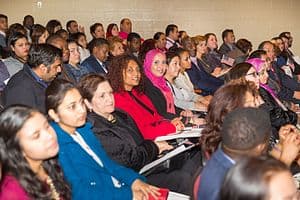U.S. Intensifies Efforts to Prevent Human Trafficking in Haiti
By Jane Morse
Washington — The State Department announced it is stepping up its efforts to prevent human trafficking — particularly of children — in post-earthquake Haiti.
The magnitude 7.0 earthquake that hit Haiti January 12 — and the strong aftershocks that followed — killed tens of thousands. Many children were separated from their families in the confusion, exposing them to a greater risk of being trafficked by the unscrupulous.
Even before the earthquake, the State Department’s Office to Monitor and Combat Trafficking in Persons had been working with Haitian authorities to control human trafficking. According to the State Department’s most recent Trafficking in Persons Report, Haiti is a source, transit and destination country for men, women and children trafficked for the purposes of forced labor and sexual exploitation. The report says several nongovernmental organizations (NGOs) working in Haiti noted that in 2008 there had been a sharp increase in the number of Haitian children trafficked for sex and labor to the Dominican Republic and the Bahamas.
Although Haitian officials recognize that human trafficking is a serious problem in their country, Haitian law does not specifically prohibit trafficking in persons, which limits the Haitian government’s ability to punish traffickers and protect victims. This is made worse by Haiti’s political instability and lack of resources, the State Department report says.
At a January 29 press briefing, Philip Crowley, assistant secretary of state for public affairs, said U.S. officials assisting in the post-earthquake relief efforts have noted a few cases involving pedophiles attempting to adopt Haitian children.
Crowley, in a statement released January 28, said that although UNICEF has taken the lead role in child protection and safety in Haiti since the earthquake, the United States is working to supplement their efforts in combating child trafficking.
Specifically, the State Department — along with UNICEF, the government of Haiti, the Red Cross and other international and nongovernmental organizations — is stepping up efforts to protect vulnerable children by:
• Registering unaccompanied and separated children and working to reunite them with their families.
• Preventing the trafficking of displaced Haitians.
• Educating Haitians about the risks of giving away children in times of crisis.
• Rebuilding the capacity of Haitian NGOs already working to protect child domestic servants, known in Haiti as restaveks.
There are some 90,000 to 300,000 restaveks in Haiti, according to the State Department’s Trafficking in Persons Report. The word restavek comes from the French “reste avec” or “one who stays with.” It is actually a social system in Haiti where poor, usually rural, families send their children to work as domestics for wealthier families. The child is to receive food, shelter and education in exchange for the labor. Many restaveks, however, find themselves in unpaid servitude and physically abused; many are trafficked.
This latest push to help Haiti’s most vulnerable victims, Crowley said, “is just the first wave of coordinated efforts in the aftermath of the earthquake which builds on existing efforts and expertise on the ground. We are coordinating further action to be announced in the coming days.”


